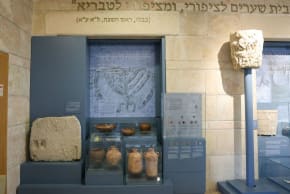Archaeology
Elephant bone found at Spanish archaeological site may have marched on Rome with Hannibal - study
The finding represents the first elephant skeletal remains found to possibly confirm Hannibal’s historical march from Carthage to Italy during the Second Punic War.


More alike than you think: CT scans of ancient Egyptian mummies reveal back pain, dental issues

Caesarea’s Roman-era aqueduct to undergo multi-million shekel preservation, restoration project

Canine remains discovered in Bulgaria show dog meat may have been Iron Age delicacy - study
Did giants exist? Ancient Egyptian papyrus points to proof of gargantuan Canaanite tribe, org says
The papyrus, known as Anastasi I, or “The Satirical Letter,” is believed by most to take the form of a somewhat mocking letter written between two army scribes.

Ancient Pilgrimage Road leading to Temple Mount opens to public after 13 years of excavations
Archaeologists say the stepped street served as Jerusalem’s main thoroughfare for pilgrims during the Second Temple period.

New archaeology exhibit marks 60 years of Knesset building with rare finds from Jerusalem, Galilee
The event hosted more than 2,000 visitors, including soldiers, police officers, Holocaust survivors, and students from schools and kindergartens across the country.

Humans, not glaciers, brought stones to Stonehenge, study confirms
After analysing over 700 zircon and apatite grains they found that glaciers likely didn’t extend to parts of England as far south as Salisbury Plain during the last ice age.

Human hand outline may be oldest rock art in the world, researchers say
The 67,800-year-old reddish-colored stenciled image has become faded over time and is barely visible on a cave wall, but nonetheless embodies an early achievement of human creativity.

Fossils found in Moroccan cave may be a close Homo sapiens ancestor
The fossilized lower jawbones of two adults and a toddler, as well as teeth, a thigh bone, and some vertebrae, were unearthed in a cave in Casablanca, Morocco.

'Grandpa, look what we found': Huckabee family uncovers ancient coins in West Bank caves
US Ambassador Mike Huckabee and his family uncovered ancient coins and jar fragments dating to the Bar-Kochba Revolt during a tour near Na’ale in the Mateh Binyamin region.

Roman-era necropolis, ancient workshops unearthed in Egypt’s western Nile Delta
Officials said the finds, announced by Egypt’s antiquities authority, shed light on settlement patterns, production, and funerary practices from the Late Period through Roman and early Islamic eras.

‘Let’s start bigger’: Israelis behind ‘The Department of Magic’ detail creative process - interview
Amit Weiss, an acting and cinema student at Sapir Academic College near Sderot, and Talia Novich, a technical writer in Haifa, are creatively inseparable.

Pottery fragments found near Ararat renew debate over site of Noah’s Ark
Professor Faruk Kaya said the dating of the ceramics found broadly aligns with traditional estimates for the era associated with Noah.
